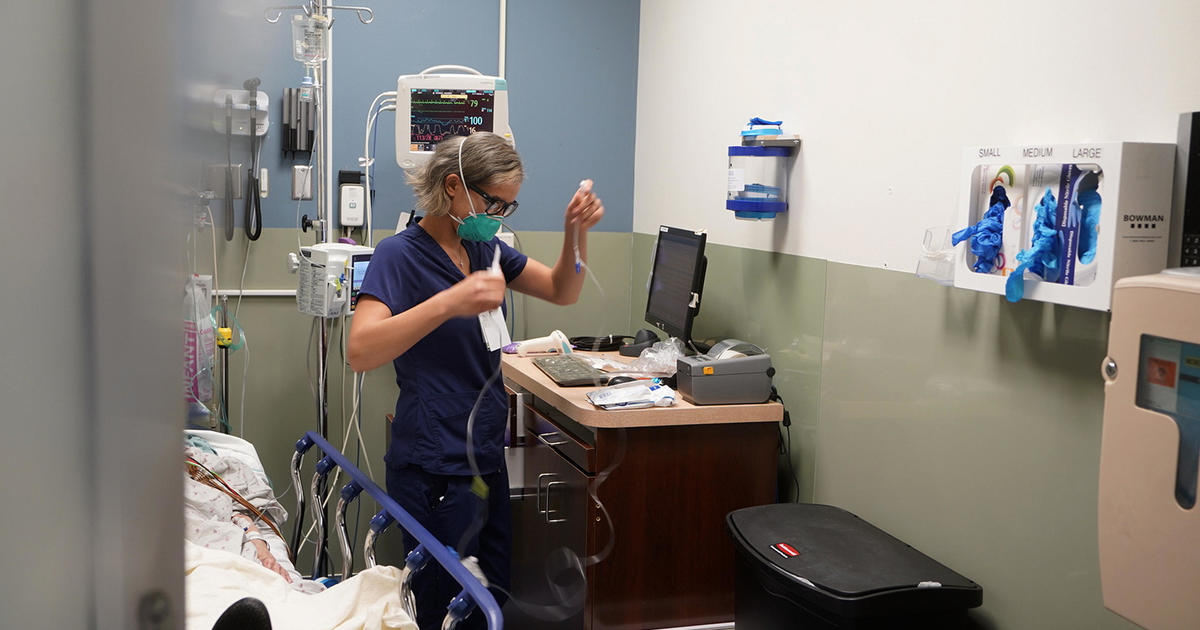Screen time linked with developmental delays in toddlerhood, study finds
Handing your baby a phone or tablet to play with may seem like a harmless solution when you're busy, but it could quickly affect their development, a new study has found.
Having anywhere from one to four hours of screen time per day at age 1 is linked with higher risks of developmental delays in communication, fine motor, problem-solving and personal and social skills by age 2, according to a study of 7,097 children published Monday in the journal JAMA Pediatrics.
"It's a really important study because it has a very large sample size of children who've been followed for several years," said Dr. Jason Nagata, associate professor of pediatrics at the University of California, San Francisco, who wasn't involved in the study.
"The study fills an important gap because it identifies specific developmental delays (in skills) such as communication and problem-solving associated with screen time," said Nagata, noting there haven't been many prior studies that studied this issue with several years of follow-up data.
The children and their mothers were part of the Japan-based Tohoku Medical Megabank Project Birth and Three-Generation Cohort Study and were recruited from 50 obstetric clinics and hospitals in the Miyagi and Iwate prefectures between July 2013 and March 2017.
The study measured how many hours children used screens per day at age 1 and how they performed in several developmental domains — communication skills, fine motor skills, personal and social skills, and problem-solving skills — at ages 2 and 4. Both measures were according to the mothers' self-reports.
By age 2, those who had had up to four hours of screen time per day were up to three times more likely to experience developmental delays in communication and problem-solving skills.
Those who had spent four or more hours with screens were 4.78 times more likely to have underdeveloped communication skills, 1.74 times more likely to have subpar fine motor skills and two times more likely to have underdeveloped personal and social skills by age 2. By age 4, risk remained only in the communication and problem-solving categories.
"One of the areas that's relatively understudied in the whole screen time literature is looking at impacts of screen exposure on very young kids, especially when screens are introduced to babies," said Dr. John Hutton, associate professor of general and community pediatrics at Cincinnati Children's Hospital Medical Center, who wasn't involved in the study. "It's definitely a global concern, and I think the findings (here) should apply to, really, other countries as well."
How screen time could affect development
The potential harms of screen time on communication skills may have to do with children being robbed of drivers for language development, Hutton said.
"Kids learn how to talk if they're encouraged to talk, and very often, if they're just watching a screen, they're not having an opportunity to practice talking," he said. "They may hear a lot of words, but they're not practicing saying a lot of words or having a lot of that back-and-forth interaction."
Technology use can take time away from interpersonal relationships that nurture social skills since real people are more multidimensional than characters on a screen, Hutton added. Looking at people's faces is when our brains turn on to figure out how to interact with them.
"Also, (with) passive screen viewing that doesn't have an interactive or physical component, children are more likely to be sedentary and then aren't able to practice motor skills," Nagata said.
If children don't have enough time to play or are handed a tablet to pacify negative emotions, that could prevent the important developmental milestone that is the ability to navigate discomfort.
"Longer term, one of the real goals is for kids just to be able to sit quietly in their own thoughts," Hutton said. "When they're allowed to be a little bit bored for a second, they get a little uncomfortable, but then they're like, 'OK, I want to make myself more comfortable.' And that's how creativity happens."
There are other factors that can affect a child's development, such as genetics, adverse experiences such as neglect or abuse, and socioeconomic factors, Nagata said.
In the latest research, mothers of children with high levels of screen time were more likely to be younger, have never given birth before, have a lower household income, have a lower education level and have postpartum depression.
The study does have limitations. Due to social desirability bias — wanting to say the "right" or socially acceptable thing — parents may underreport their child's screen time and overreport how their child is doing developmentally, experts said.
Additionally, the authors didn't have details on what children's screen time involved, and not all forms are equal in their capacity to harm or benefit, experts said.
"The other question that's always really important is, is the parent watching with the child?" Hutton said. "When a parent is watching with a child, that tends to mitigate a lot of the negatives."
Healthier ways to occupy your child
If you need to keep your toddler busy so you can get things done or have some solitude, try giving them a book, coloring materials or toys, experts said. They can even sometimes enjoy these activities while secured in a highchair.
If you need to rely on screens sometimes, opt for educational content or video chats with a loved one so they can still get some social interaction, Nagata said.
One issue with some online children's content is that parents will think it's educational because it's marketed as such and has lots of information about the alphabet, colors, numbers or animals their children can see and hear, Hutton said. But what jumpstarts learning is content that helps children apply their knowledge beyond just rote memorization — so they can "navigate the real world, where things are more unpredictable and require more creativity and resilience," he said.
Hutton and Nagata recommended choosing longer videos since watching lots of short videos could affect children's attention span and ability to understand what they're watching.
Be choosy about when you rely on screen time, and turn devices off when they're not in use, Nagata said. "Aimless viewing can also distract kids from then focusing on an activity that's at hand or in-person communication."
Additionally, live by example by not having an excessive amount of screen time yourself, since kids tend to mimic what they see, experts said.
READ MORE: How to know if you have 'phone addiction' — and 12 ways to address it
The American Academy of Pediatrics recommends considering the quality of screen time rather than just quantity, but the organization does have resources for determining guidelines and limits for your family — such as its family media plan you can tailor to your own family's needs and advice for helping your kids build healthy habits.
"We need to just slow down and … be as careful and mindful as we can about keeping kids anchored in the real world, which is really how we evolved as humans," Hutton said. "There's going to be plenty of time for screen time later once we get a better sense of who the kids are and what they need."



